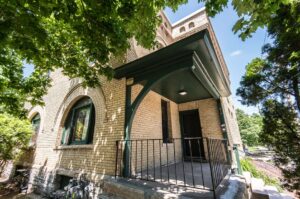What is Hope’s “Community Ownership” program?
Hope’s Community Ownership Program supports renters to become owner-occupant landlords of small multifamily properties (duplexes, triplexes, etc.). The program prepares and supports participants to purchase a duplex/triplex in the community, live in one unit and maintain the other(s) as an affordable rental opportunity. The program includes training with small business development support to build capacity for success as an owner-occupant and landlord coupled with supporting buyers to access homes without the burden of major capital improvement needs.
Our program includes a partnership with the City of Lakes Community Land Trust, with the land trust model of ownership providing a valuable resource both for new homeowners and for providing an alternative to gentrification for future generations. A core piece of the program is our 6-week training in which we cover topics such as:
- Understanding the Land Trust model
- Being credit-ready for a mortgage (and how to improve your credit)
- Planning for being a landlord (having a business plan)
- Laws and regulations for landlords / homeowners
After the training ends, the program aims to support graduates on their journey to ownership, setting goals, and working to help meet them. We also offer connections and resources for potential owner-occupants, including connections to HomeStretch trainings, down payment assistance resources, homebuyer counseling and credit resources, and more.


 Existing small, multi-unit buildings (duplexes/triplexes) provide important opportunities for affordable housing and community ownership but are often overlooked by traditional development models. Development pressures – or long-term operational challenges – now threaten many of these buildings; our project secures them as resources for affordable rental housing, community ownership, and community wealth building. This model has enormous potential as an anti-displacement strategy for communities facing gentrification.
Existing small, multi-unit buildings (duplexes/triplexes) provide important opportunities for affordable housing and community ownership but are often overlooked by traditional development models. Development pressures – or long-term operational challenges – now threaten many of these buildings; our project secures them as resources for affordable rental housing, community ownership, and community wealth building. This model has enormous potential as an anti-displacement strategy for communities facing gentrification.